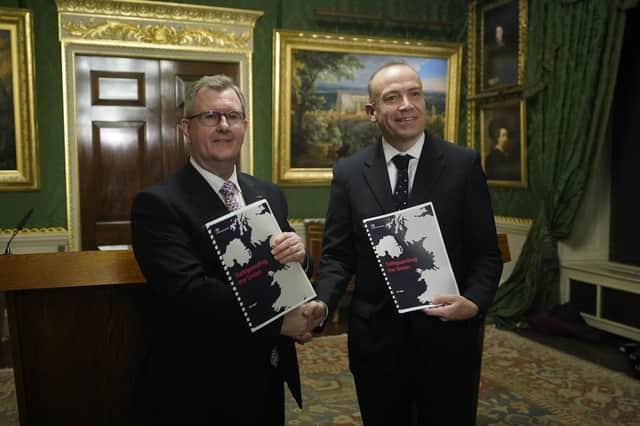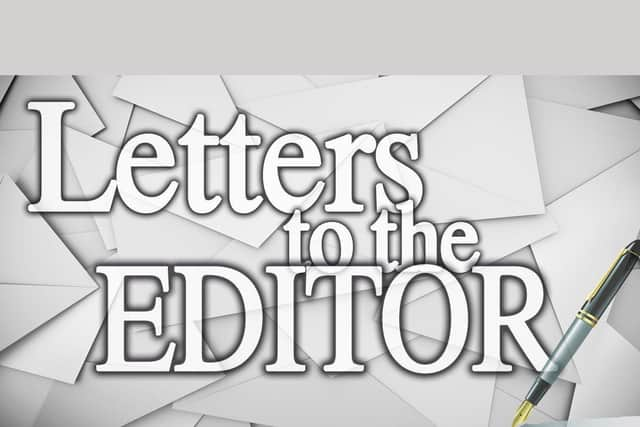Letter: The DUP’s seven tests might have been ambitious but they were deliverable


As highlighted in your piece (DUP Irish Sea border row, February 14), in the debate in the House of Lords last week on ‘Safeguarding the Union’, several DUP peers stated that, as regards the core issues, the reforms to the Windsor Framework were window dressing.
Lord Morrow called for a new prime minister, one who would declare the Windsor Framework void because the treaty undermines its claims to maintain the integrity of the United Kingdom.
Advertisement
Hide AdAdvertisement
Hide AdIt is an argument that was much used over some years, particularly in respect of the protection of the Belfast Agreement.


Much work has gone into making a declaration under the Vienna Convention on the Law of Treaties and what the effect of such a declaration would be.
The conclusion was that such a declaration would lack credibility and the UK’s standing would be very seriously damaged. Consequently, the UK’s economy would suffer from a substantial loss of UK standing and from retaliatory legal sanctions.
Parliament would not countenance such a move and public opinion would not bear it. There is no possible future prime minister, no future party, no future Parliament that could or would pursue this policy. So why advance it?
Advertisement
Hide AdAdvertisement
Hide AdLord Dodds made much of the failure to address the existing regulatory border, whereby Northern Ireland’s manufacturers must follow EU goods rules.
Addressing this was never even on the table for discussion. He stated there was no reason for these rules to protect the EU single market for companies not exporting to the EU. But this is not the case.
Without checks on the island of Ireland, these goods are free to be exported to the EU; under the Windsor Framework and all its predecessors, they have a legal right to access the EU single market, and this right is only exercisable and sustainable because these goods must by law conform to EU single market rules.
It is physically impossible to separate products produced in Northern Ireland by intended destination without imposing a customs post at every factory and farm gate.
Advertisement
Hide AdAdvertisement
Hide AdThe EU has completely rejected the alternative of mutual recognition, not least because accepting that principle for close trading partners would, in its view, undermine its single market.
Many argued that this was not a problem given Northern Ireland’s relatively small volume exports to the EU, but this did not persuade the European Commission or the member states; four member states are smaller than Northern Ireland and four others are either the same size or less than twice the size of Northern Ireland. These states account for 30% of member states.
Of the two main pillars of the EU, the single market has worked well, whilst the euro has been in severe crisis and its future remains under a cloud of uncertainty. The EU can survive with some uncertainty around one of its main pillars, but not around both. Once they had legal certainty on alignment, there was no reason for them to take risks with less secure alternatives. This was a negotiation we lost in the last half of 2017.
Understanding the absolute impossibility of getting treaty change agreed by 27 states and the European Commission is surely one of the reasons that the seven tests of the DUP, set out in July 2021 and voted on in the May 2022 assembly elections, did not call for ending the application of EU law in Northern Ireland.
Advertisement
Hide AdAdvertisement
Hide AdAlthough it was claimed in the Lords debate last week that this demand is covered by the test on the restoration of the Act of Union 1800’s Article VI rights to equal treatment, this argument is unconvincing. Article VI rights were for access for Irish goods to the markets of Great Britain and the Empire on equal terms with producers in Great Britain — a serious concern prior to the Act. Those rights are now secured.
The DUP’s tests were ambitious but deliverable. The argument put forward in last week’s Lords debate that the continued application of some EU law is contrary to the seven tests is also refuted by the tests themselves.
The fourth test set by the DUP was on addressing the democratic deficit —a deficit that would not need addressing if EU law — albeit limited — was not to apply in Northern Ireland.
Roderick Crawford, Senior research fellow at Policy Exchange.
He is author of ‘The Northern Ireland Protocol: the Origins of the Current Crisis’ (Policy Exchange, 2021) and ‘The Northern Ireland Protocol: The Clash of Two Treaties’ (Policy Exchange, 2023).